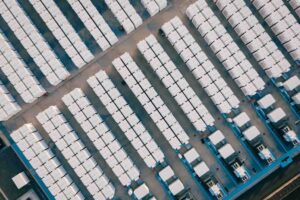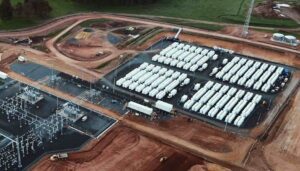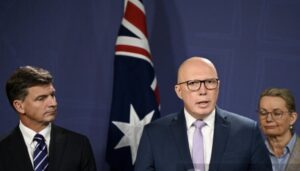The two biggest utilities in Europe, German power giants E.ON and RWE – have further cleared the decks as they prepare to catch up with the country’s energy transition and focus on renewables and distributed energy.
E.ON overnight revealed a net loss of €3.2 billion in 2014, as it wrote down the value of many of its fossil fuel plants. Rival RWE took a similar step last year, reporting a net loss of €2.8 billion as it wrote off the value of its coal-fired assets.
Both companies have fought vigorously against the German government and its Energiewende – its transition to a renewables-based energy grid and its rapid phase out of nuclear power.
However, since the centre-right government of Germany has held firm on its policies, both on the deployment of renewables and the phasing out of nuclear – E.ON and RWE have now accepted that their future lies in new technology, large scale renewables, distributed generation, battery storage and micro-grids.
E.ON plans to jettison its entire portfolio of centralised generation – including coal, gas and its remaining nuclear assets, so it can focus on advanced distribution networks and smart energy solutions for its customers.
E.ON chief executive Johannes Teyssen said the energy market would be shaken up by digital and other technological innovation. “We see a lot of opportunities here for products and services that we’re developing for and in partnership with our customers,” he said.
RWE says it is also focusing on networks, new products such as smart meters, and renewable energy, although it is not yet splitting its assets. It says, however, that it is watching E.ON’s plans with interest. Analysts show signs of impatience, noting that the inability to generate cash from fossil fuel generation, and a balance sheet that has to cater for decades of outflows for nuclear decommissioning, the company lacks a clear answer about its long term positioning.
Teyssen said the split will be one of the biggest of any kind – both in the energy industry and in Europe. He compared the two companies to a “car and the road” – the new E.ON being the car, and the old one being the road.
“You can’t have one without the other,” he said. But E.ON, after the split, intends to have no shares in the “old” company. The long term future of centralised generation – nuclear in Germany and fossil fuels in general, simply doesn’t warrant it.
Teyssen says the energy market would be shaken up by digital and other technological innovation. “We see a lot of opportunities here for products and services that we’re developing for and in partnership with our customers,” The Guardian quoted him as saying.
RWE, despite writing off the value of most of its coal assets last year, says it is still struggling to make profits – because of the sharp slump in wholesale prices in Germany.
CEO Peter Terium says almost half of the company’s conventional power stations were not making money.
Operating profits from conventional power production tumbled 29 per cent in the last year, and the cash-flow from its conventional generators was barely break-even.
“The situation in conventional electricity generation in particular is deteriorating too fast and too severely for us to counteract,” Terium said. At current prices, “RWE Generation will have to post an operating loss in the not-too-distant future.”
This explains the move by the two German energy giants into renewables and distributed energy.
Analysts expect the shift in the EU’s energy policy will accelerate the establishment of a new market design, which will increasingly rely on distributed (i.e. decentralised) generation, lower consumption and smart technologies.
“We believe that – across the industry – value will keep moving away from large power plants towards networks and ‘client solutions’,” UBS analysts noted in a recent report.
The policy and energy landscape is changing across western Europe because governments are encouraging wind, solar and other renewables as part of a switch to a low carbon economy.
This is mainly motivated by growing fears about the impact of carbon emissions on climate change, but they are also driven by a determination to improve energy security, and lessen their reliance on Russian gas imports.
RWE said it may shut down more coal plants because of the downturn. After a brief spike following the closure of some nuclear plants immediately post Fukushima, emissions are now at their second lowest level since 1990, and black coal generation is also at its second lowest level since 1990.
Energy efficiency has meant that the nexus between economic growth and power consumption has been decoupled, wholesale prices are at record lows, and retail prices are also starting to fall.
Both RWE and E.ON are hoping that Germany will set up so-called capacity markets to subsidize conventional energy producers, which they say are needed for stabilising power supply given the intermittency of wind- and solar-generated electricity.
But the German government is resisting. It argues that such subsidies are not needed, and that energy storage could provide an answer. Even so, a new study shows that long term, or seasonal storage, may not be needed in Germany for many years.
RWE and E.ON are also waging battles with the government over the nuclear fuel tax, and the level of provisions for decommissioning nuclear plants, which will need to occur in the next 10 years.











